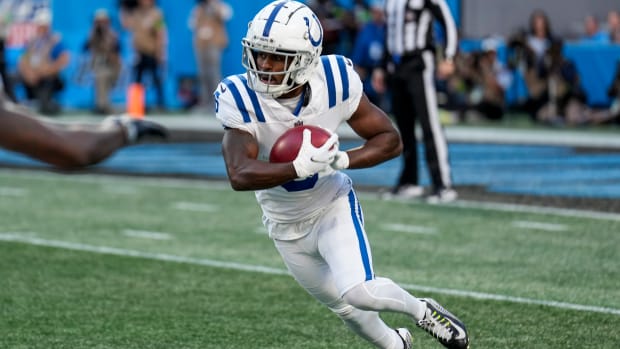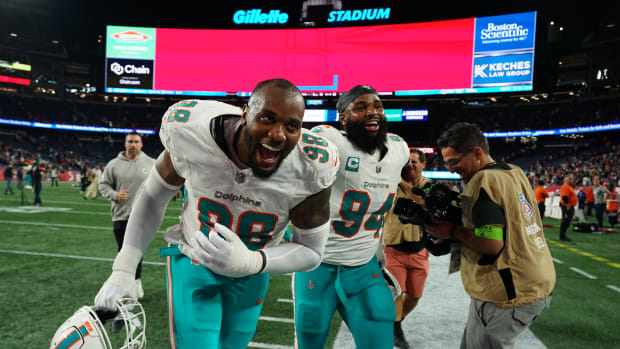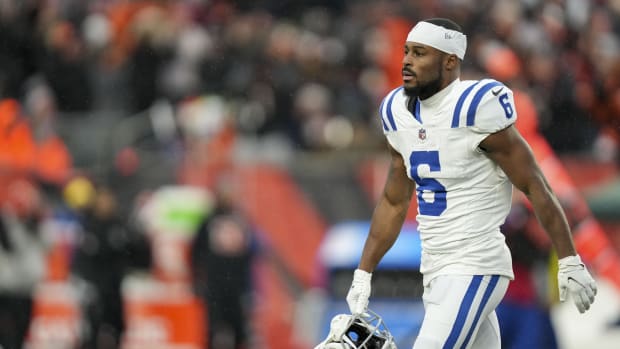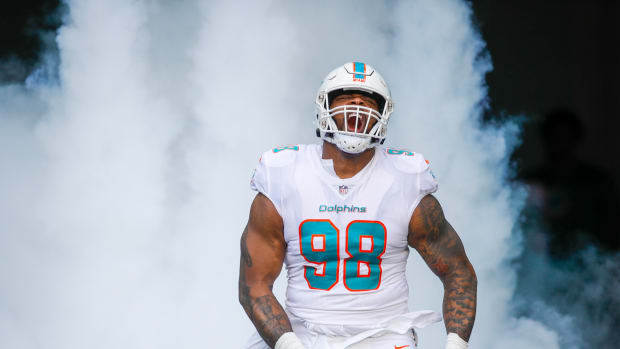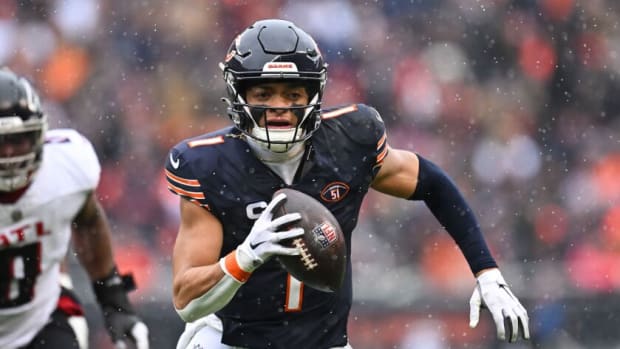ColtsSpeak: Ferryn Palmer (Part II)
PhilB: Did you see what Colts GM Chris Ballard said about racism last Thursday?
Ferryn: Yes, I did.
PhilB: I wrote in the tweet this is how an NFL voice should sound when talking about racial inequality.
Ferryn: You’re exactly right.
PhilB: You could tell Ballard was upset, frustrated, ashamed, embarrassed, and contrite. I heard (head coach) Frank Reich earlier in the week, and Frank was great, too. He was only the second NFL coach to make a public statement about it. The other one was Brian Flores of Miami. I thought that was noteworthy that Frank was the first white coach to say anything. So many others haven’t said anything. And some have been stupid in what they said.
Ferryn: More importantly than what is being said, I love Chris Ballard and I love what he said, it’s what they’re doing, it’s what they’ve done. For me as a Colts fan, (owner) Jim Irsay and everybody, they don’t need to say anything. I pay attention to the players. I see what they’ve been tweeting. Just the fact that the Colts have been having their meetings and not discussing football at all, but discussing what’s going on with everybody. That speaks volumes. I’m very happy and proud to be a fan of this type of organization. I can’t speak enough on how highly I regard them, based on their actions.
PhilB: I couldn’t agree with you more. When I listened to Ballard and Reich, I kept thinking, ‘This is character. This is the kind of character we don’t see enough of.’ You nailed it. You’re on it.
Ferryn: That’s also a credit to Mr. Irsay. When you look back at our organization, you look back at (former coaches) Jim Caldwell and Tony Dungy, just everybody who has been a part of this organization with exception to one GM before Ballard, they have been fantastic. They’ve been good men, good people, and really good at what they do. I’m very, very proud. I think we have maybe the best organization in the National Football League.
PhilB: On a personal aside, Mr. Irsay retweeted my Ballard story on the GM’s statement. It got more than 58,000 impressions. Former Colts Jerraud Powers and Darius Butler liked it and retweeted. There were others who noticed it. The other thing it did was it smelled out a lot of racists, a lot of people who don’t get it. That’s even some people who follow me, including some who are friends on Facebook. They showed me they are either racist or completely ignorant and have no idea or empathy for what it’s like to be black in this country. As much as I was glad to spread the word and get reaction to it because it was real and genuine what Ballard said, it showed an ugly side of society in a real disgusting way. I hid comments from my friends because I was embarrassed and probably blocked a dozen people on Twitter for saying stupid things.
Ferryn: Thanks for sharing that. I agree with you 110 percent. I see them coming out, right? The snakes are coming to the top of the grass. One thing I will say, in my experience, I’ve been experiencing the same thing. I grew up in Columbus, Ind. I went to high school and played football here. I was the only African-American kid on the football team, my junior and senior year. What I will say is I don’t block ‘em and I don’t unfriend ‘em. I want to see ‘em. What tends to happen is maybe somebody I know, maybe who is not a friend of mine, but someone I know personally who I might see around town and chat with, maybe they’re friends with this person who shared this view. I wouldn’t see that if I blocked ‘em. I wouldn’t see that if I didn’t have friends.
PhilB: I didn’t unfriend the two on Facebook. I hid their comments. I’m with you, I want to know what they think. There were some negative comments on Twitter that I didn’t block because, like you said, people have a right to express their opinion. You want to know what they think. I went after the people who were downright nasty, downright mean. When I see cruelty, even during a game, where one person is making fun of somebody else, that sets me off. I want to defend fans as much as I can.
Ferryn: While we’re on this topic, I wanted to make a comment about Drew Brees. I’m a big state of Indiana fan. This is my home, Indiana. I’ve always rooted for Drew Brees (a former Purdue quarterback), but I wasn’t shocked by his comments (about saying players disrespect the flag by kneeling during the National Anthem). Personally, I was more disappointed in the apology. It was a great apology, it was well-written, it was well-said. The reason I was disappointed was because Drew has made those same comments in 2016. He’s been on record, so he really believes that. While I might disagree, that’s what he meant in his heart. I really don’t think he meant anything negative by it. I think he really believes that. For him to apologize that quickly made me feel like it was not that sincere. It made me feel like, inside it’s how he really feels, but it’s a bad look so he’s got to do that. That was my take. I still like Drew Brees. I feel like he’s confused, right? We disagree about that topic. But I respected him more before the apology. I didn’t like what he said or didn’t agree, but I respected I’m more because he toed that line. It was honest.
PhilB: You’re going to think I’m telling you what I want to hear, but my wife and I said the same thing to each other. She can get excited. I was disappointed in what Drew said because he’s done a lot for New Orleans and I know he’s a character guy, but he was basically aligning himself with President Trump and that opinion, trying to make the kneeling about their political agenda, that it was about disrespecting the flag and veterans. Even with Drew’s direct tweet to President Trump, like he’s going to distance himself from what he believes, my wife and I said the same thing to each other. I’m glad he was emotional and went to the emotional bank to try to convince Michael Thomas and the rest of the Saints that he was sorry, I think all meant was, ‘I didn’t realize I would upset you as much as I did.’ The one thing that was missing from all of this was, ‘I’ll take a knee with you.’
Ferryn: That’s exactly right. He did that earlier. I’ll give him his due.
PhilB: You know as well as I do, the first game, when Thomas and other Saints take a knee, I want to see what Drew Brees does.
Ferryn: That’s exactly right. And I want to see what the Dallas Cowboys do as an organization.
PhilB: OK, I’ll get back to football here. We could probably talk about this all day. But like I said from the outset, it’s great timing to talk to you because you’re black. You need to be heard. It carries more weight and it’s more real when it comes from someone who knows what racism is like. I wrote my own personal testimony before Ballard spoke. I started out that I was white and not a racist. I gave a personal account of how I moved into the inner city as a kid and was the only white kid in my class. That shaped my opinion for how I would look at people based on how they looked.
Ferryn: Do you have siblings?
PhilB: Yes, I have two younger brothers. I wrote about us living in the inner city as a personal experience because I wanted people to know how I’m not saying I know what it’s like to be black, but I know what it’s like to be different from everyone in the room. My classmates treated me like I was special. Because I was white, they treated me differently because they thought I was special. I wasn’t deserving of it, but it showed me that we’re all just looking for respect and to be treated fairly. When a bully wanted to fight on the playground, I had six classmates jump in front and say, ‘You have to go through us first. He’s with us.’ To learn that at such a young age. It takes a while to learn as you get older, ‘I’m never going to be black, so I can never truly know.’ But it doesn’t take much when you’re 12 to realize that’s how you want to treat everybody else for the rest of your life.
Ferryn: I asked about your siblings because, as adults, do you feel like they share your point of view when it comes to race?
PhilB: Absolutely. Maybe not as much as me because I’m in the fish bowl, I’ve dealt with African-Americans my whole life in sports. But, yeah, both of my brothers feel the same way.
Ferryn: I asked all that to ask you about this: I had a conversation last night with a friend I grew up with who happens to be white, one of my closest friends. Out of the blue, he texted me and said, ‘Hey, I want to come over and have a conversation about race.’ I was worried and I thought it was strange, because I’ve grown up with this guy. He’s got a mixed daughter. So he gets here and we get to talking. He said, ‘We’ve never talked about it.’ I said, ‘You’re right, because nothing needed to be said.’ We got on the topic of his siblings. He’s got two younger sisters. Both of them grew up and share his views. But his parents and his family are very racist. So I posed the question to him, ‘How do you think it is that you and your siblings came up the way you did with that background?’ I’m thinking there’s a nugget there where we can hopefully apply that to other people in that situation. I know so many other people who grew up and share the same views as their parents. So I’d like to ask you the same question: How do you think it is that you and your brothers grew up and became how you are, coming from that familial situation?
PhilB: You’re going to agree with this, but something Ballard said that I nodded when he said it, it’s taught, it’s learned behavior. Young people who are racist learn that behavior or are taught that, either at home by their parents or in society in their interactions on the playground. So my experience at 12, I don’t have a racist bone in my body. As early as 18 or 19 years old and visiting my father, we got into nasty verbal fights. He would make these racist comments and I would tell him it was wrong, that he should say that. He would say, ‘I can say whatever I want in my house. When you get your own house, you can say what you want.’ But I tried to tell him, ‘It disrespects me when you degrade a race and spew that crap.’ We went at it so many times on that. He couldn’t handle Charles Barkley speaking his mind on TV. He would call him every name in the book. He couldn’t handle seeing any black man do well. He thought they were taking over this country, and so on and so on. I always thought, ‘You should be better than this. You’re college-educated. You served in the military. You served in Vietnam. You had to be serving with black men in the military. How could you ever feel this way?’ He’s dead now, died of cancer. He never changed. But that was another example that I cited in my story. When I was old enough to stand up to him, I did every time. It drove him nuts. He didn’t understand why it pissed me off.
Ferryn: That’s a difficult thing. I applaud you for doing that. My friend that I’m speaking of, he got into knock-down, drag-em-out fights with his step-dad about us. There was a group of us. And my friend was the only white guy in our group, but he was one of us. When he was old enough to confront his step-dad, he did. And he did it every time. I applaud you. It’s not an easy thing to do.
PhilB: It was because of what Frank Reich said, how he couldn’t stay silent, that not saying anything would add to the problem. I thought about that. I realized if I wrote about it, it would attract attention, and not all of it good. But I made up my mind that Frank was right. I had experiences that I could share that were relevant on race. I don’t have to prove myself to my family and friends. They know who I am and how I am. But I have a platform, just like Frank and Chris do. Not as big as their platform, but I’ve done this for more than 20 years. I’ve written a Colts book and about so many players. (Former Colts tight end) Marcus Pollard walked up to me from behind at the combine and gave me a big bear hug and scared the hell out of me. Marcus and Edgerrin James were two of my favorite players of all time. They were great to deal with. … This is what got me about Ballard. He said he thought he knew about racism. Then he started talking to black people on his staff. When he heard some of the stories on how they were treated, it enraged him. When he was asked about Colin Kaepernick taking a knee, he said the NFL didn’t get it right. He thought he knew, but didn’t know, and had no idea. The sad thing is, that story I wrote when I poured my heart out and tried to be a voice, it didn’t get much traction. Just a few likes here and there. Ballard’s story, it goes viral. I don’t understand why my experiences, which are pretty unique, didn’t seem to register much in social media.
Ferryn: Here’s what I’ll say about that. It doesn’t sound like from listening to you that you wrote that particular piece for the likes. If you sparked one conversation in one family in the state of Indiana, or wherever around the country, it was worth it. Good was done. I really hope that everybody who has a platform such as yourself tells their truth. Conversations need to be had. If everybody who has that platform can spark one conversation at a dinner table that wouldn’t have normally happened without it, that’s a good thing. That’s how we get to where we need to be.
PhilB: Thank you. That means a lot. Because I was disappointed.
Ferryn: Don’t be.
(If you’re a diehard Colts fan and want to share ColtsSpeak opinions, send an email to phillipbwilson24@yahoo.com. The response has been overwhelming, so your name will be added to a growing list.)
